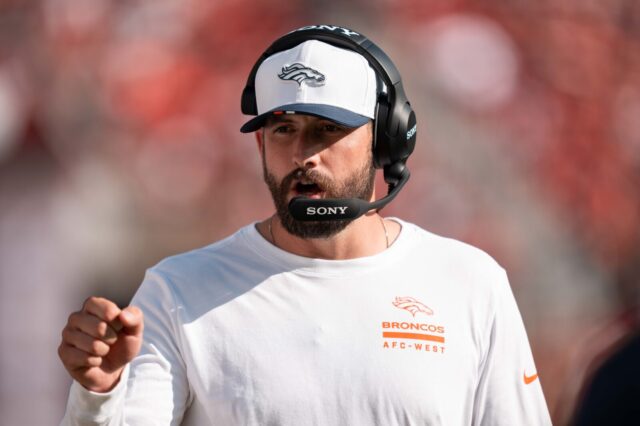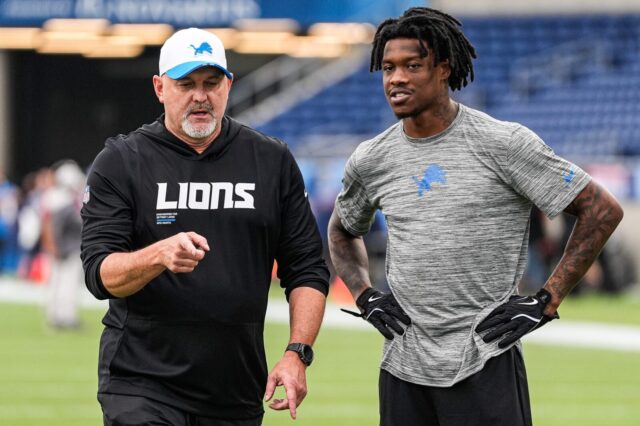“You give loyalty, you’ll get it back.”
Those were the wise words spoken by Tommy Lasorda, putting his own spin on the adage that faithfulness is a two-week street. The former Dodgers manager’s sage advice apparently hasn’t made its way to Dove Valley, however.
Last week, during his pre-draft press conference with the adoring local media, John Elway ripped into Demaryius Thomas. The Broncos general manager publicly criticized the team’s star receiver, upset that the wideout wasn’t on hand for Denver’s “voluntary” offseason workouts.
“Tell me why that makes sense that he wouldn’t be here working out with us?” Elway asked the gathered throng, posing a rhetorical question for everyone in attendance to ponder. “That’s part of the game, but it makes no sense for him not be here.”
The message was clear: There’s no place for contract squabbles on a team that is trying to make one last Super Bowl run before the clock strikes midnight on their future Hall of Fame quarterback’s illustrious career; be a loyal soldier and show up for work.
For the most part, Elway’s stance drew nothing but applause in the Mile High City. In part, that’s because No. 7 can do no wrong in these parts; the man who won back-to-back championships with the Broncos would draw rave reviews in Denver if he starred in Paul Blart: Mall Cop 2. But the hardline position was also popular because nobody feels sorry for someone with a $13 million offer on the table; Thomas would be set for life if he simply played the 2015 season under the franchise tag salary that the team is offering him.
As a result, people have been ripping Thomas all week long. They can’t accept that he’d be so greedy, unwilling to put off a multi-year contract for 12 months. And they can’t believe that he would be so selfish, putting his own long-term interests in front of the Broncos immediate goal.
Both of those ideas are absolute poppycock. They are easy stones to throw from the peanut gallery.
The money part of the equation is relatively simple to tackle. Yes, $13 million – the amount DT will earn in 2015 if he simply accepts the franchise tag – is more money than most people can ever fathom earning. Even after paying taxes, a modest five percent return on the remaining money would generate roughly $30,000 per month in interest income – for life. So it’s understandable that fans wouldn’t be very sympathetic of Thomas’ situation.
But that analysis is rooted in the wrong comparison; it’s based on comparing $13 million to zero. In that equation, of course the offer from the Broncos looks fair. The more accurate assessment, however, should pit the $13 million for one year against $70 to $80 million across five or six years; that’s the type of contract Thomas figures to garner on the open market, given what players like Jeremy Maclin (five years, $55 million) and Torrey Smith (five years, $40 million) inked during the offseason.
Through that prism, Thomas’ position is much more understandable. While $13 million is a lot of money, it certainly isn’t $70 million. And while the wide receiver figures to get that kind of contract a year from now, there’s no guarantee that he won’t suffer an injury that will prevent him from ever cashing that winning lottery ticket. Nobody in their right mind would delay that kind of payday, especially when there’s a chance – no matter how remote – that the opportunity could vanish.
The claim of selfishness, on the other hand, is a little trickier. Fans are emotionally invested in the team; they bleed orange and blue. They want the Broncos to win; nothing else matters. So they can’t understand when a player, someone who should really care about victories, seemingly puts something ahead of the ultimate goal.
That fails to grasp the financial nature of the sport, however. After all, pro football is a business. The players are simply trying to maximize their earning potential, just like every other worker in America. It’s hard to fault them for such an approach, especially considering the likelihood of injury and average lifespan of a career in their chosen profession.
And it puts the onus for the problem on Thomas, which is completely unfair. In reality, the current situation is more Elway’s fault than it is his star receiver’s doing.
For months, bordering on years, the Broncos GM has been saying that he wants to get a contract done with the Thomases – Demaryius and tight end Julius Thomas. It didn’t happen last offseason. And this year, it didn’t happen, either. As a result, Julius is now in Jacksonville and Demaryius is in limbo.
Obviously, Elway doesn’t “want” to get contracts done; if he did, both players would have inked long-term deals with the team. Instead, it appears that No. 7 wants to get the most out of his star players, for as long as he can, at the lowest possible price. And when he’s exceeded that threshold, he’ll show them the door.
Sounds harsh? Look at the team’s recent history for proof that it’s an accurate assessment.
After posting back-to-back 1,000-yard seasons in 2012 and ’13, Eric Decker wasn’t even offered a contract to stay with the Broncos. After four years in Denver, the team that drafted him in 2010 let the wideout leave for New York; the orange and blue were more than happy to go with a mercenaries like Wes Welker and Emmanuel Sanders at receiver instead.
Despite posting 1,586 combined rushing and receiving yards on a Super Bowl team, plus accumulating 13 touchdowns along the way, the Broncos made zero effort to keep Knowshon Moreno in town last year. The player who had overcome injuries and a demotion to become the heart and soul of the team’s offense had to depart for Miami in order to receive a financial reward for his commitment and efforts.
Those players were joined by Mike Adams, Robert Ayers, Zane Beadles, Trindon Holliday, Duke Ihenacho, Jeremy Mincey, Shaun Phillips, Dominique Rodgers-Cromartie and Wesley Woodyard on the list of contributors from the 2013 AFC title-winning team that weren’t asked back in 2014.
And that trend continued this offseason. Along with Julius Thomas, key players like Orlando Franklin, Nate Irving, Terrance Knighton, Will Montgomery, Rahim Moore, Jacob Tamme and Mitch Unrein left for greener (at least in terms of money) pastures during the upcoming campaign.
All of those guys were loyal to the Broncos, toiling through injuries to help the team strive for a championship. And most weren’t even extended the courtesy of a contract offer when their deals expired.
As a result, should it be a huge shock that Demaryius Thomas doesn’t feel a ton of loyalty toward the Broncos? Should it come as a major surprise that he doesn’t expect Denver will take care of him after he plays out the one-year franchise tag?
He knows the situation; the Broncos are going to use the system to avoid making a long-term commitment to him, while taking one last shot at the Super Bowl with Peyton Manning behind center. And that’s certainly within their rights; but it’s also pretty disingenuous to be bent out of shape when Thomas doesn’t hop on board and go along for the ride.
The wide receiver is thinking about one year, not five. And he’s worried about cashing in his one winning chip, not making sure a quarterback who has earned nearly a $250 million during his career gets a chance to chase a fourth Super Bowl appearance and one more ring.
The Broncos are worried about their own self-interests, so why can’t Thomas do the same thing? It seems a little unfair to ask otherwise.
But that’s exactly what Elway did last week; he called out his star receiver, publicly questioning his commitment and loyalty. It wasn’t his finest moment.
The Broncos have had two years to make things right with Demaryius Thomas. They obviously don’t want to.
Thomas is finally calling them out on it. Only in Denver, where Elway holds court unlike any other person, would the wide receiver’s decision be criticized instead of cheered. Only in the Mile High City, where the GM is given carte blanche to do whatever he wants, would the player be cast as the villain.
If the Broncos want loyalty from their players, they need to start offering it first. Tommy Lasorda figured that out years ago; apparently, John Elway needs a lesson in that management approach.



